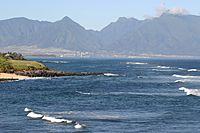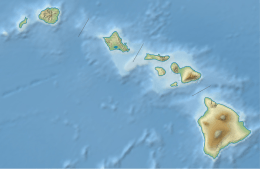Puʻu Kukui facts for kids
Quick facts for kids Pu'u Kukui |
|
|---|---|

Pu'u Kukui as seen from North Shore Maui
|
|
| Highest point | |
| Elevation | 5,788 ft (1,764 m) |
| Prominence | 5,668 ft (1,728 m) |
| Listing | |
| Geography | |
| Location | Maui, Hawaiʻi, U.S. |
| Parent range | Hawaiian Islands |
| Topo map | USGS Lahaina |
| Geology | |
| Age of rock | <1.3 Mega-annum |
| Mountain type | Eroded shield volcano |
| Volcanic arc/belt | Hawaiian–Emperor seamount chain |
| Climbing | |
| Easiest route | Hike |
Puʻu Kukui is a tall mountain peak in Hawaiʻi. It is the highest point in the West Maui Mountains, also known as Mauna Kahalawai. This mountain is part of a large, protected nature area. It was formed by a volcano a very long time ago. Today, Puʻu Kukui is famous for being one of the wettest places on Earth!
Contents
Puʻu Kukui: Hawaii's Wet Mountain
Puʻu Kukui stands at 5,788-foot (1,764 m) (about 1,764 meters) high. It is the highest peak in the West Maui Mountains. This area is also called Mauna Kahalawai. The mountain is part of the Puʻu Kukui Watershed Management Area. This is a private nature preserve that covers 8,661-acre (35.05 km2) (about 35 square kilometers). It is managed by the Maui Land & Pineapple Company.
How Puʻu Kukui Was Formed
Puʻu Kukui was created by a type of volcano called a shield volcano. Over time, the volcano's top part, called a caldera, wore away. This wearing away is called erosion. The erosion helped form the beautiful Īʻao Valley that you can see today.
A Very Rainy Place
Puʻu Kukui is one of the wettest spots on Earth. It gets an average of 386.5 inches (9,820 mm) (about 9,817 millimeters) of rain each year. This makes it the third wettest place in Hawaii. Only Big Bog, Maui and Mount Waiʻaleʻale get more rain. Because so much rain falls, and the water cannot drain away quickly, a special type of bog has formed. The ground here is very dense and deep. It is also quite acidic.
Amazing Plants and Animals
Puʻu Kukui is home to many unique living things. These include endemic plants, insects, and birds. "Endemic" means they are found only in this one special place.
Special Plants of Puʻu Kukui
One special plant found here is the greensword (Argyroxiphium grayanum). There is also a unique type of ʻōhiʻa lehua (Metrosideros polymorpha var. pseudorugosa). Many different kinds of lobelioid plants also grow here. Because of the mountain's very wet climate and the peat soil in the bog, many plants, like the ʻōhiʻa, grow as dwarfs. This means they are much smaller than usual.
Protecting This Special Place
To protect these rare plants and animals, access to the Puʻu Kukui area is limited. Only researchers and people working on conservation are allowed to visit. This helps keep the delicate ecosystem safe and healthy.
 | Anna J. Cooper |
 | Mary McLeod Bethune |
 | Lillie Mae Bradford |


